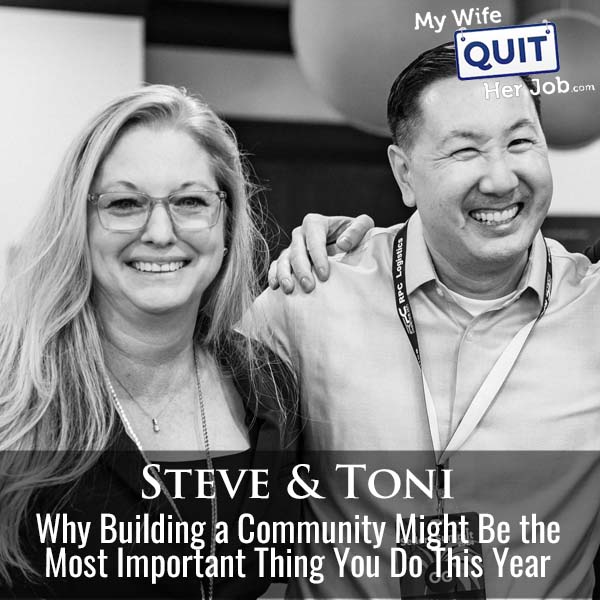596: Why Building a Community Might Be the Most Important Thing You Do This Year

```html MyWifeQuitHerJob.com Explores Community Building on Discord: A Strategic Shift for E-Commerce
In a recent episode of the My Wife Quit Her Job podcast, Steve Chou and his wife, Toni, delved into the increasingly vital role of community building in the e-commerce landscape. The discussion centered on their experiences, both successes and stumbles, in establishing a community, particularly focusing on their new Discord-based initiative. The move reflects a broader trend of businesses seeking alternative platforms to connect with customers amid declining engagement rates on traditional channels like email and SMS.
Why Community Matters More Than Ever
Chou emphasized that building a strong community is no longer a peripheral marketing tactic but a core necessity for online businesses. He cited declining deliverability rates for email and SMS marketing as primary drivers for exploring community-driven engagement. A dedicated community, he argues, fosters a more direct and reliable line of communication with customers, cultivating loyalty and advocacy.
The Discord Experiment: A Geek's Paradise?
The decision to launch a Discord community was driven by several factors, including the platform's extensibility through APIs, its cost-effectiveness (being free), and Chou's familiarity with the platform. Discord, often associated with gaming communities, offers robust customization options, allowing for the integration of bots and other features to enhance user experience and community management.
However, the initial launch was not without its challenges. A small fraction of users experienced technical difficulties joining the platform, highlighting a potential barrier to entry for less tech-savvy individuals. Despite these initial hurdles, the community quickly gained traction, attracting a dedicated group of active participants.
Discord vs. Facebook Groups: A Battle for Engagement
A significant portion of the podcast was dedicated to comparing Discord with Facebook Groups, a long-standing platform for online communities. Chou expressed strong reservations about Facebook Groups, citing issues with message visibility, search functionality, and the platform's inherent distractions. He argued that Facebook's algorithm often obscures important posts, making it difficult for community members to find relevant information and for administrators to effectively manage discussions.
Toni Chou, while acknowledging the limitations of Facebook Groups, pointed out its widespread adoption and familiarity among a broad demographic. She also noted that any community platform, including Discord, requires a dedicated app and can be susceptible to distractions, albeit within the confines of the specific community.
The Moderation Challenge and Potential Solutions
One of the key concerns raised during the discussion was the time and effort required to effectively moderate and manage an active community. Toni Chou highlighted the experiences of other community leaders who have faced challenges with spam, negativity, and maintaining productive discussions. Steve Chou, however, suggested leveraging Discord's API to automate moderation tasks, potentially using AI-powered sentiment analysis to identify and address inappropriate content. He also proposed enlisting the help of long-time community members to assist with moderation.
Expert Perspective: The Evolving Landscape of Online Communities
Dr. Sarah Miller, a professor of marketing at the University of California, Berkeley, specializing in online community management, commented on the trend: "Businesses are recognizing the limitations of traditional social media platforms for fostering genuine engagement. Platforms like Discord offer greater control over the community environment and allow for more targeted interactions. However, success hinges on creating a valuable and engaging experience for members, and that requires a significant investment of time and resources."
Beyond Discord: Exploring Alternative Platforms
The podcast also touched on alternative community platforms, including Slack (which was deemed too expensive for large communities) and Geneva (a relatively unknown platform). The Chous emphasized the importance of choosing a platform that is both user-friendly and sustainable in the long term.
Historical Context: The Rise of Online Communities
The concept of online communities dates back to the early days of the internet, with platforms like bulletin board systems (BBS) and early forums serving as virtual gathering places for individuals with shared interests. Over time, social media platforms like Facebook and Twitter became dominant forces in online communication, but the focus shifted from community building to broadcasting and individual expression. The current resurgence of dedicated community platforms reflects a growing desire for more intimate and focused online interactions.
Looking Ahead: The Future of E-Commerce Communities
The My Wife Quit Her Job podcast episode underscores the growing importance of community building in the e-commerce sector. While the specific platform may vary, the underlying principles remain the same: create a valuable and engaging experience for members, foster a sense of belonging, and actively manage the community to ensure a positive and productive environment. As online businesses continue to navigate the evolving digital landscape, community building will likely play an increasingly crucial role in driving customer loyalty and sustainable growth. ```
Originally sourced from: WifeQuitHer Job
